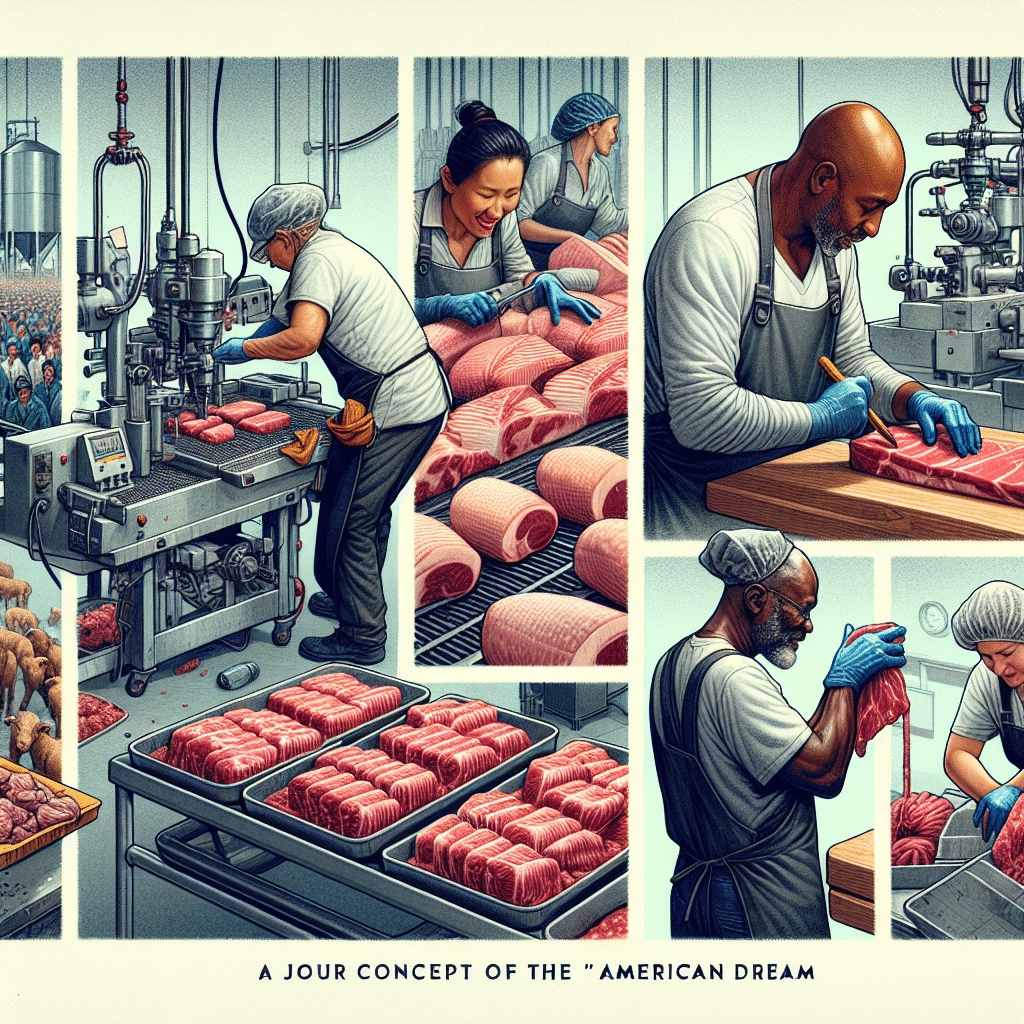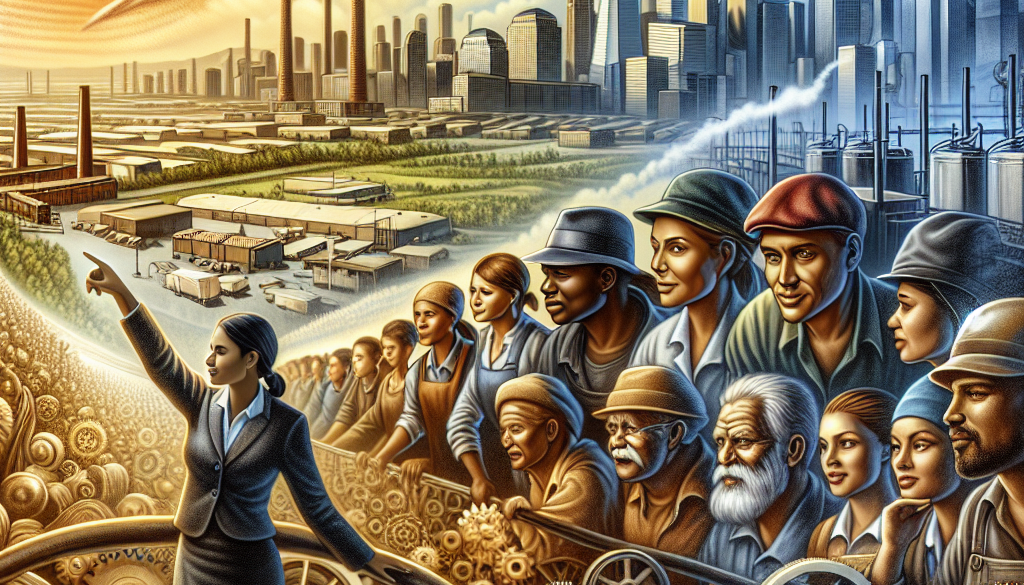The American Dream: A Journey of Resilience, Passion, and Impact in the Meatpacking Industry
-
Table of Contents
- The American Dream in the Meatpacking Industry: Resilience and Impact
- The Historical Roots of Meatpacking and the American Dream
- Challenges and Resilience in the Meatpacking Workforce
- The Modern Meatpacking Industry: Innovation and Adaptation
- Statistics: The Meatpacking Industry by the Numbers
- Conclusion: The Enduring Legacy of the American Dream in Meatpacking
- ETprotein: Meeting Modern Protein Needs
The American Dream in the Meatpacking Industry: Resilience and Impact

The American Dream is a concept that has long been associated with the pursuit of happiness, success, and upward mobility. It’s a dream that has drawn countless individuals to the United States in search of a better life. Within the tapestry of American industry, the meatpacking sector stands as a testament to this dream, showcasing stories of resilience, passion, and significant impact. This article delves into the journey of the American Dream within the meatpacking industry, exploring its historical roots, the challenges faced by workers, and the industry’s evolution over time.
The Historical Roots of Meatpacking and the American Dream
The meatpacking industry in the United States has been a cornerstone of the economy since the late 19th century. It was one of the first industries to be industrialized, and it played a pivotal role in the development of American cities like Chicago and Omaha. The industry attracted waves of immigrants and rural Americans alike, all seeking employment and the promise of a better life.
- Immigrant Influence: The industry’s workforce was, and still is, heavily comprised of immigrants who brought diverse skills and cultures to the urban centers where meatpacking plants thrived.
- Technological Advancements: Innovations such as refrigerated rail cars and the disassembly line process revolutionized the way meat was processed and distributed, contributing to the industry’s growth.
- Economic Impact: Meatpacking became one of the first American industries to reach a national scale, contributing significantly to the country’s economic expansion.
Challenges and Resilience in the Meatpacking Workforce
The meatpacking industry is known for its harsh working conditions, which have been the subject of scrutiny and reform over the years. Workers in this sector have historically faced long hours, low pay, and dangerous work environments.
- Working Conditions: The early 20th century saw workers enduring grueling conditions, with little regard for safety or workers’ rights.
- Labor Movements: The formation of labor unions and the push for better working conditions have been central to the industry’s history, leading to significant improvements over time.
- Resilience of Workers: Despite these challenges, workers in the meatpacking industry have shown remarkable resilience, banding together to fight for their rights and a fair share of the American Dream.
The Modern Meatpacking Industry: Innovation and Adaptation
In recent decades, the meatpacking industry has undergone significant changes, with technological advancements and shifts in consumer demand leading to new challenges and opportunities.
- Automation: The introduction of automation and robotics has transformed many aspects of meat processing, increasing efficiency but also displacing some labor-intensive jobs.
- Health and Safety: There has been a heightened focus on health and safety, with regulations and industry standards improving conditions for workers.
- Consumer Trends: The rise of organic and plant-based diets has prompted the industry to adapt, with some meatpacking companies expanding into alternative protein sources.
Statistics: The Meatpacking Industry by the Numbers
Statistics offer a glimpse into the scale and impact of the meatpacking industry:
- Employment: The meatpacking industry employs hundreds of thousands of workers across the United States.
- Economic Contribution: The industry contributes billions of dollars to the U.S. economy annually.
- Production Volume: The U.S. is one of the world’s largest producers of beef, pork, and poultry, with meatpacking plants operating at high capacities to meet global demand.
Conclusion: The Enduring Legacy of the American Dream in Meatpacking
The American Dream within the meatpacking industry is a complex narrative of struggle, triumph, and transformation. It is a story that mirrors the broader American experience, highlighting the resilience and passion of those who have sought to make a life for themselves and their families. The industry’s impact on the economy and society is undeniable, and as it continues to evolve, it will undoubtedly remain a significant chapter in the story of America’s industrial and cultural heritage.
ETprotein: Meeting Modern Protein Needs
In light of the evolving landscape of the meatpacking industry and the growing interest in alternative protein sources, ETprotein offers a range of high-quality protein products that cater to the needs of today’s consumers. Whether you’re looking for organic plant-based proteins or specialized supplements, ETprotein’s offerings are designed to meet the highest standards of purity and quality.
For those in the meatpacking industry looking to diversify their product lines or for businesses seeking reliable protein sources, ETprotein’s products represent the cutting edge of nutrition and health. With a commitment to non-GMO, allergen-free ingredients, and a focus on sustainability, ETprotein is poised to support the industry’s next phase of growth and innovation.
About ETprotein:
ETprotein, a reputable protein and L-(+)-Ergothioneine (EGT) Chinese factory manufacturer and supplier, is renowned for producing, stocking, exporting, and delivering the highest quality organic bulk vegan proteins and L-(+)-Ergothioneine. They include Organic rice protein, clear rice protein, pea protein, clear pea protein, watermelon seed protein, pumpkin seed protein, sunflower seed protein, mung bean protein, peanut protein, and L-(+)-Ergothioneine EGT Pharmaceutical grade, L-(+)-Ergothioneine EGT food grade, L-(+)-Ergothioneine EGT cosmetic grade, L-(+)-Ergothioneine EGT reference grade and L-(+)-Ergothioneine EGT standard. Their offerings, characterized by a neutral taste, non-GMO, allergen-free attributes, with L-(+)-Ergothioneine purity over 98%, 99%, cater to a diverse range of industries. They serve nutraceutical, pharmaceutical, cosmeceutical, veterinary, as well as food and beverage finished product distributors, traders, and manufacturers across Europe, USA, Canada, Australia, Thailand, Japan, Korea, Brazil, and Chile, among others.
ETprotein specialization includes exporting and delivering tailor-made protein powder and finished nutritional supplements. Their extensive product range covers sectors like Food and Beverage, Sports Nutrition, Weight Management, Dietary Supplements, Health and Wellness Products, and Infant Formula, ensuring comprehensive solutions to meet all your protein needs.
As a trusted company by leading global food and beverage brands and Fortune 500 companies, ETprotein reinforces China’s reputation in the global arena. For more information or to sample their products, please contact them and email sales(at)ETprotein.com today.












